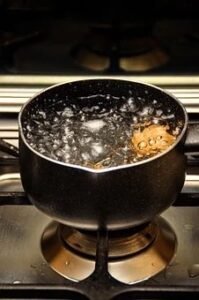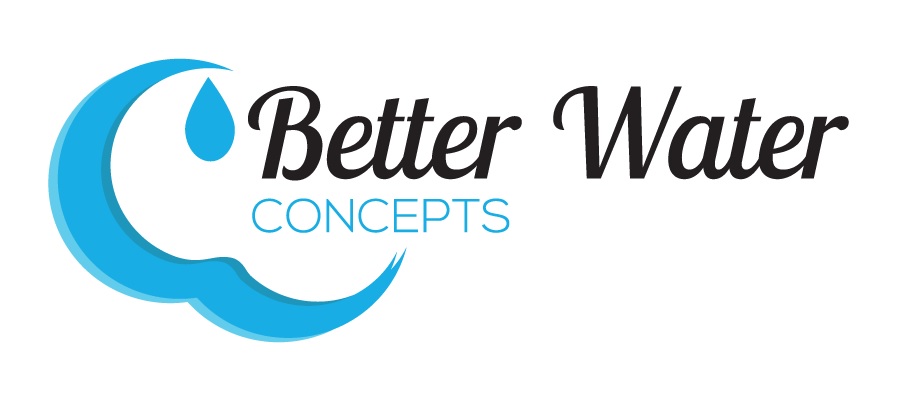We're an affiliate
We hope you love the products we recommend! Just so you know, we may collect a share of sales or other compensation from the links on this page. Thank you if you use our links, we really appreciate it!
Does Boiling Water Remove Chlorine?
 The simple answer to the question: “Does boiling water remove chlorine?”, is yes.
The simple answer to the question: “Does boiling water remove chlorine?”, is yes.
The reason is, as water temperature increases, it releases dissolved gases. You can see this by setting a glass of water on the counter and letting it warm to room temperature. You will notice tiny bubbles form on the sides of the glass. These bubbles contain dissolved gases, like oxygen, that have come out of solution.
Since chlorine is a gas, raising the water temperature to boiling will release chlorine from it.
There are some other things to consider when you are trying to get rid of chlorine from water by boiling it.
Why Does My Water Have Chlorine in it Anyway?
First, you need to understand why the chlorine is in the water. Water systems add chlorine to the water to disinfect it. That simply means killing all the disease-causing organisms. Here are the main water-borne diseases chlorine kills:
Typhoid
Dysentery
Cholera
Hepatitis A and E
Poliomyletis
Adding chlorine to water does not sterilize it, but the water will not contain any organism that will make you sick.
Chlorine exists as free chlorine, combined chlorine and total chlorine. It is measured as parts per million (ppm).
Free chlorine is a powerful disinfectant. It reacts quickly with minerals or organic matter in the water.
Combined chlorine is chlorine that has reacted with the nitrogen and ammonia in organic matter. Combined chlorine is a weak disinfectant.
Chloramine is another name for combined chlorine.
Total chlorine is the sum of free and combined chlorine.
Second, free chlorine by itself does not stay in the water system for very long. So, if the water system is large and you are far from the water treatment plant, you could lose the protection of the ability of the chlorine to disinfect.
To safeguard the far reaches of the water pipe network, some treatment plants add ammonia to the water. The ammonia combines with chlorine to form chloramines. Chloramines are not as strong as chlorine by itself, but they will stay in the water system longer.
In short, chlorine is in the water to protect you. That doesn’t mean you have to drink it.
How Long Do I Have to Boil My Water to Get Rid of Chlorine?
Just bringing water to a boil and then removing the heat will not remove very much chlorine. You need to boil water for about 15 minutes to remove chlorine from tap water. Free chlorine in the water is pretty easy to remove.
Most likely, your tap water has chloramine in the water. That compound is much more difficult to remove. Boiling water to remove chloramine will take from 20 minutes up to an hour.
Boiling water to get rid of chlorine could also create a danger of scalding. So, be careful when you’re boiling water, especially around children.
There’s a Better Way To Remove Chlorine From Water
While boiling water will remove chlorine, there are three faster and safer solutions.
Devices with a Carbon Filter will Remove Chlorine
The least expensive option to remove chlorine from water without boiling is an activated carbon filter. Even the least expensive water pitcher will remove most of the chlorine and chloramine from water.
Activated carbon reacts with chlorine and chloramine to neutralize it. The activated carbon will also remove undesirable taste and odor from water. It will also reduce lead, copper and mercury. You may need higher quality filters to achieve the best results if you want to remove more than just chlorine.
Below is a list of the different types of activated carbon filters.
Water Filter Pitcher
Water Filter Bottle
Water Faucet Filter
Under Sink Filter
Whole House Filter
Reverse Osmosis Filters
Reverse osmosis filters force water through a membrane that will only allow water through. This creates a high concentration of contaminants ahead of the filter that gets flushed away. It actually takes a minimum of two gallons of water to make one gallon of drinking water.
The funny thing about reverse osmosis filters is, they require chlorine removal before the water gets to the filter.
Huh?
Chlorine and especially chloramine can damage the filter membrane. How do you think they remove the chlorine?
If you guessed a carbon filter, you’d be right!
There are one, two or sometimes even three carbon filters in a reverse osmosis filter. If all you want to remove is chlorine and chloramine, a reverse osmosis filter might be overkill.
Distillation
The third method of removing chlorine is with a distiller. I’m sure you’re thinking, “Isn’t that the same as boiling the water to remove chlorine?”
Not quite!
Boiling water to remove chlorine only heats the water to the boiling point for a short period. A distiller will heat the water to boiling and collect the water vapor or steam and cool it back to a liquid and put it in a different container. The process leaves behind most of the contaminants because they can’t be turned into steam.
As strange as it sounds, many distillers have a carbon filter in them as well. Chlorine removal is not the only purpose of the carbon filter. But the chlorine still gets removed.
For distillers, there could be some volatile organic compounds or VOCs in the water that can turn to vapor along with the water vapor. The carbon filter will remove the VOCs ensuring the water is pure.
Conclusion: Does Boiling Water Remove Chlorine?
The answer is yes. The video above shows that concept visually.
The other question to ask is: Why do you want to remove chlorine from your water?
Do you want to remove chlorine from the water you are putting in a fish tank or something similar?
Are you needing chlorine free water for cooking or a home brewery?
You can accomplish chlorine removal faster and easier with an activated carbon filter.
Reverse osmosis and distillation are not a viable option for chlorine removal alone.
Find the water filter to meet your needs here.
